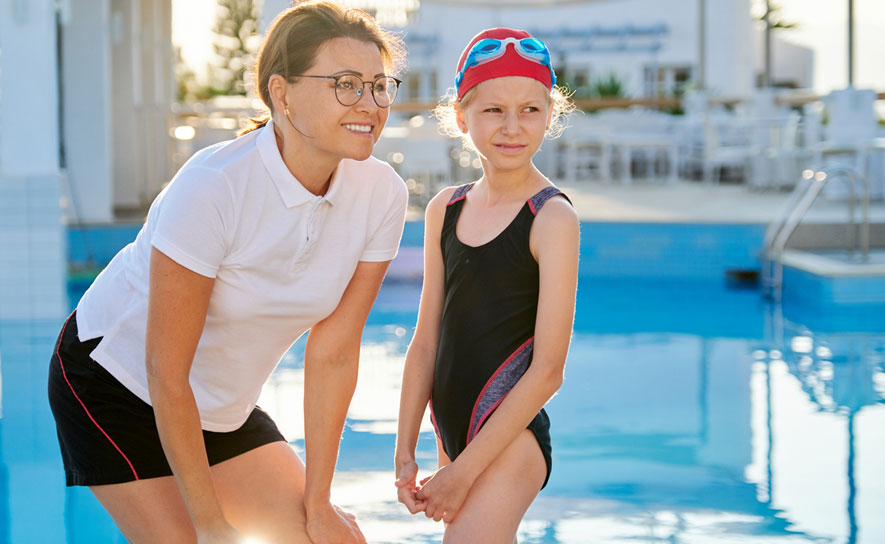USA Swimming News
5 Things for Parents to Avoid When Cultivating Grit

by TrueSport//USA Swimming Partner
Raising athletes to be resilient and persistent in the face of struggles or challenges is an important role for every parent, but it can be hard to know where to draw the line when helping athletes develop ‘grit.’ An athlete with grit, as explained by Angela Duckworth, the scientist who coined the term, is able to “sustain interest in and effort toward very long-term goals.”
Here are a five common mistakes that parents make when trying to instill that spirit in athletes.
Avoid Cultivating a Winner-Only Mindset
It’s easy to praise hard work and ‘grit’ when it’s leading to successful games or competitions. Unfortunately, this means that determination and grit often end up feeling synonymous with ‘winning’ and ‘being a winner’ for young athletes.
It’s your responsibility as a parent to help them understand that it’s possible – and perhaps more important – to have grit when things aren’t going their way.
A board-certified family physician and respected youth development and resilience expert, Deborah Gilboa, MD, explains on her website, “The most important lessons are learned in adversity, so we have to remind ourselves not to shield young people, but to enable and encourage their problem-solving and self-confidence.”
At the end of the day, emphasizing an athlete’s determination during hard times is more important to their long-term development than praising it when the athlete is finding success.
Avoid Offering Extrinsic Motivation
Offering a reward like a pizza party for winning seems like an easy motivational tactic, but it can backfire. Even athletes who are initially intrinsically motivated can become focused on the material rewards rather than performance and grit for the sheer love of the sport.
Gilboa agrees and shares, “The social science research on behavior change shows that rewards systems (usually called Token Economies in the literature) are effective for only short periods. Over time, the motivation decreases even if the rewards don’t change.”
“The biggest problem is this is not great preparation for the world ahead of our children,” Gilboa states on her website. “When we want our kids to learn good habits, we need to expect it of them and link the mastery of a task to a new privilege. Kids are desperate to be acknowledged as older or more mature and this is a great motivator.”
Avoid Pushing Grit Through Injury and Illness
Dedication is a great quality, but a parent can accidentally pressure an athlete to push through illness or even injury in the name of ‘giving it your all.’ Pay close attention to athletes for signs of injuries or illness, especially in athletes you know already display a lot of persistence without prompting. There’s a line between persisting through a rough patch and pushing so hard that an athlete ends up injured and sitting out for the season…or even longer.
Gilboa reassures parents that even without risking further injury to play, the athlete “can learn resilience – by overcoming the adversity of injury. To do that, he needs you to see that he is facing something that is difficult for him. You don’t have to understand why it’s difficult or agree that it is. You do have to help him see the steps to recovery and praise him when he chooses to follow those steps.”
Avoid Promoting a Fixed Mindset
Telling your athlete that they are ‘naturally talented’ or ‘the team all-star without even practicing’ is merely enabling a fixed mindset.
“Children who wither when confronted with challenges view their abilities as fixed – once they fall short, it’s very hard for them to rebound. On the other hand, kids who develop a “growth” mindset believe they can improve (in ability and intelligence) over time and with practice. They view new challenges as fun and exciting,” explains Gilboa.
Avoid Using Nouns Instead of Verbs
A recent study showed that children persist better with difficult tasks when they don’t have to figure out what it means to ‘be’ something. More specifically, "using verbs to talk to children about behavior – such as 'you can help’ – can lead to more determination following setbacks than using nouns to talk about identities, for instance, 'you can be a helper,’” explains the study’s author.
For your athlete, that may mean asking them to “congratulate each teammate post-game," versus telling them to “be a good teammate.” This also relates to talking about how a game went: The players aren’t ‘losers,’ they ‘lost a game.’
_____
Remember that helping your athlete see how hard work and determination payoff is critical to their current and future goals.

About TrueSport
TrueSport®, a movement powered by the experience and values of the U.S. Anti-Doping Agency, champions the positive values and life lessons learned through youth sport. TrueSport inspires athletes, coaches, parents, and administrators to change the culture of youth sport through active engagement and thoughtful curriculum based on cornerstone lessons of sportsmanship, character-building, and clean and healthy performance, while also creating leaders across communities through sport.
For more expert-driven articles and materials, visit TrueSport’s comprehensive LEARN resource.
This content was reproduced in partnership with TrueSport. Any content copied or reproduced without TrueSport and the U.S. Anti-Doping Agency’s express written permission would be in violation of our copyright, and subject to legal recourse. To learn more or request permission to reproduce content, click here.
